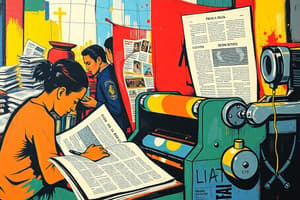Podcast
Questions and Answers
What is the origin of the term 'journalism'?
What is the origin of the term 'journalism'?
- From the French word 'journal', meaning daily newspaper (correct)
- From the Latin word 'diarium', meaning daily record
- From the Italian word 'giornale', meaning newspaper
- From the Greek word 'chronos', meaning time
What type of journalism involves in-depth research and reporting on specific topics or issues?
What type of journalism involves in-depth research and reporting on specific topics or issues?
- Investigative Journalism (correct)
- Print Journalism
- Broadcast Journalism
- Online Journalism
Who is responsible for gathering and reporting news stories?
Who is responsible for gathering and reporting news stories?
- Reporter (correct)
- Anchor
- Editor
- Columnist
What is a key principle of journalism?
What is a key principle of journalism?
What is the primary goal of a journalist?
What is the primary goal of a journalist?
What is a significant challenge facing journalists today?
What is a significant challenge facing journalists today?
What type of journalism involves news reporting and publishing on digital platforms?
What type of journalism involves news reporting and publishing on digital platforms?
What is a fundamental right that journalists strive to protect?
What is a fundamental right that journalists strive to protect?
Flashcards are hidden until you start studying
Study Notes
Definition and History
- Journalism is the practice of gathering, processing, and disseminating news and information to the public through various media channels.
- The term "journalism" comes from the French word "journal," meaning daily newspaper.
- The history of journalism dates back to ancient civilizations, with evidence of news gathering and dissemination in ancient Greece, Rome, and China.
- Modern journalism emerged in the 17th century with the development of newspapers and printing presses.
Types of Journalism
- Print Journalism: news reporting and publishing in physical newspapers and magazines.
- Broadcast Journalism: news reporting and broadcasting on television and radio.
- Online Journalism: news reporting and publishing on digital platforms, including websites, social media, and blogs.
- Investigative Journalism: in-depth research and reporting on specific topics or issues, often involving undercover or secret investigations.
- Citizen Journalism: news reporting and publishing by non-professional journalists, often through social media and blogs.
Roles in Journalism
- Reporter: gathers and reports news stories.
- Editor: reviews, revises, and approves news stories.
- Anchor: presents news stories on television or radio.
- Columnist: writes opinion-based articles or commentary.
- Photographer: captures images to accompany news stories.
Ethics and Challenges
- Objectivity: journalists strive to report news in an unbiased and impartial manner.
- Accuracy: journalists must ensure the accuracy and truthfulness of reported information.
- Confidentiality: journalists may protect sources and maintain confidentiality.
- Freedom of the Press: journalists may face challenges and restrictions on their ability to report news freely.
- Fake News: the spread of misinformation and disinformation poses a significant challenge to journalists and the public.
Key Concepts
- News Values: factors that determine the newsworthiness of a story, including timeliness, proximity, impact, and human interest.
- Journalistic Integrity: the maintenance of high ethical standards in news reporting and publishing.
- Media Literacy: the ability to critically evaluate and understand news and information.
- Gatekeeping: the process of selecting and filtering news stories for publication.
Definition and History
- Journalism involves gathering, processing, and disseminating news and information to the public through various media channels.
- The term "journalism" originates from the French word "journal," meaning daily newspaper.
- Journalism has its roots in ancient civilizations, including ancient Greece, Rome, and China.
- Modern journalism emerged in the 17th century with the advent of newspapers and printing presses.
Types of Journalism
- Print Journalism: reports and publishes news in physical newspapers and magazines.
- Broadcast Journalism: reports and broadcasts news on television and radio.
- Online Journalism: reports and publishes news on digital platforms, such as websites, social media, and blogs.
- Investigative Journalism: conducts in-depth research and reporting on specific topics or issues, often involving undercover or secret investigations.
- Citizen Journalism: allows non-professional journalists to report and publish news, often through social media and blogs.
Roles in Journalism
- Reporter: gathers and reports news stories.
- Editor: reviews, revises, and approves news stories.
- Anchor: presents news stories on television or radio.
- Columnist: writes opinion-based articles or commentary.
- Photographer: captures images to accompany news stories.
Ethics and Challenges
- Objectivity: journalists strive to report news in an unbiased and impartial manner.
- Accuracy: journalists must ensure the accuracy and truthfulness of reported information.
- Confidentiality: journalists may protect sources and maintain confidentiality.
- Freedom of the Press: journalists face challenges and restrictions on their ability to report news freely.
- Fake News: the spread of misinformation and disinformation poses a significant challenge to journalists and the public.
Key Concepts
- News Values: factors determining newsworthiness, including timeliness, proximity, impact, and human interest.
- Journalistic Integrity: maintaining high ethical standards in news reporting and publishing.
- Media Literacy: the ability to critically evaluate and understand news and information.
- Gatekeeping: selecting and filtering news stories for publication.
Studying That Suits You
Use AI to generate personalized quizzes and flashcards to suit your learning preferences.




